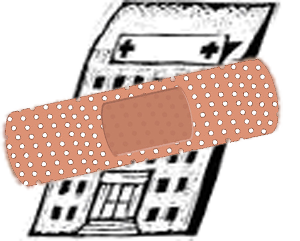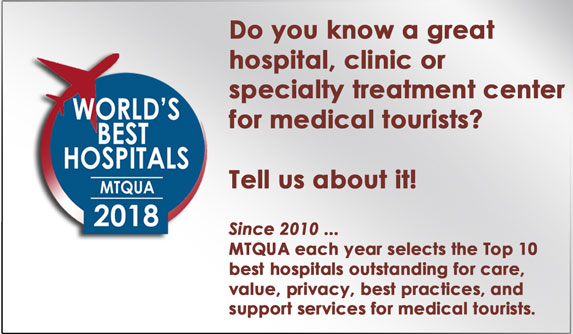 If you haven’t recently visited – or read – your hospital’s website, you may want to take a closer look at it. It may be very sick. Any facilitator linking to and promoting hospitals expecting to get help in closing a patient or an employer, needs to take a hard look at these sites.
If you haven’t recently visited – or read – your hospital’s website, you may want to take a closer look at it. It may be very sick. Any facilitator linking to and promoting hospitals expecting to get help in closing a patient or an employer, needs to take a hard look at these sites.
In building web pages for the Top 10 World’s Best Hospitals for Medical Tourists on the MTQUA website, we’re discovering that most hospital websites are breaking basic rules.
I assigned a new intern in the office to work on this as her first project, expecting it would be a straightforward, simple task – a few facts about each hospital that a medical travel facilitator or a prospective patient would want to know.
World’s Best Hospitals don’t have best websites
Leslie, the intern, is having a lot of trouble with this assignment. But it’s not her fault she can’t find the information that would be useful to prospective patients or medical travel facilitators. Going on the sites of the Top 10 World’s Best Hospitals, I found that not one provides much useful or valuable information. Put aside calls for transparency for the moment – none gives basic information about the size of the facility, the number of beds it has or the number of private vs. semi-private rooms, the number of operating theatres, intensive care units, or cardiac care units.
For the most part, all I read was marketing gobbledygook. Real honest-to-goodness information is barely evident on these websites. I’m not referring to doctor C .V.s or lists of “specialties”. That’s the low-hanging fruit. The sites have plenty of this sort of “stuff”. Finding anything more useful, that makes one hospital stand out from another, is almost impossible. All marketing noise.
Better medical tourism hospital websites
Two hospitals of the 10 are different. Bumrungrad International is heads and shoulders above the rest and clearly deserved to win an award in 2008 for the best hospital website. Shouldice, as a highly specialized hospital, offers specific information about its speciality and its business.
How do hospitals – and the medical travel agents that reproduce the same marketing noise on their own websites – expect patients to find them? How often do prospective patients conduct a google search for “medical tourism?” “Excellence?” “World class?” “Orthopedics?” “Specialty?” Longer phrases and long tail search keywords and phrases won’t separate you from the rest of the hospitals, if you are offering up the same old marketing silliness as everyone else.
Hospitals miss even basic web design
Taking a hard look at these websites, I see that hospitals in medical destinations are doing a far worse job of marketing themselves than I’d thought. Even the basics of web design are not met. How then can these hospitals expect patients to find them by searching?
A poor website helps no one, not the hospital, not the healthcare consumer, and most certainly not the facilitator.
Hospitals, take your website temperature. If you’re sick, fix it fast. You have no one to blame but yourself when medical tourists go elsewhere for care.
Related articles

 >
>
Pingback: How sticky is your hospital or medical tourism website? · MTQUA | Medical tourism quality, safety and patient care best practice.